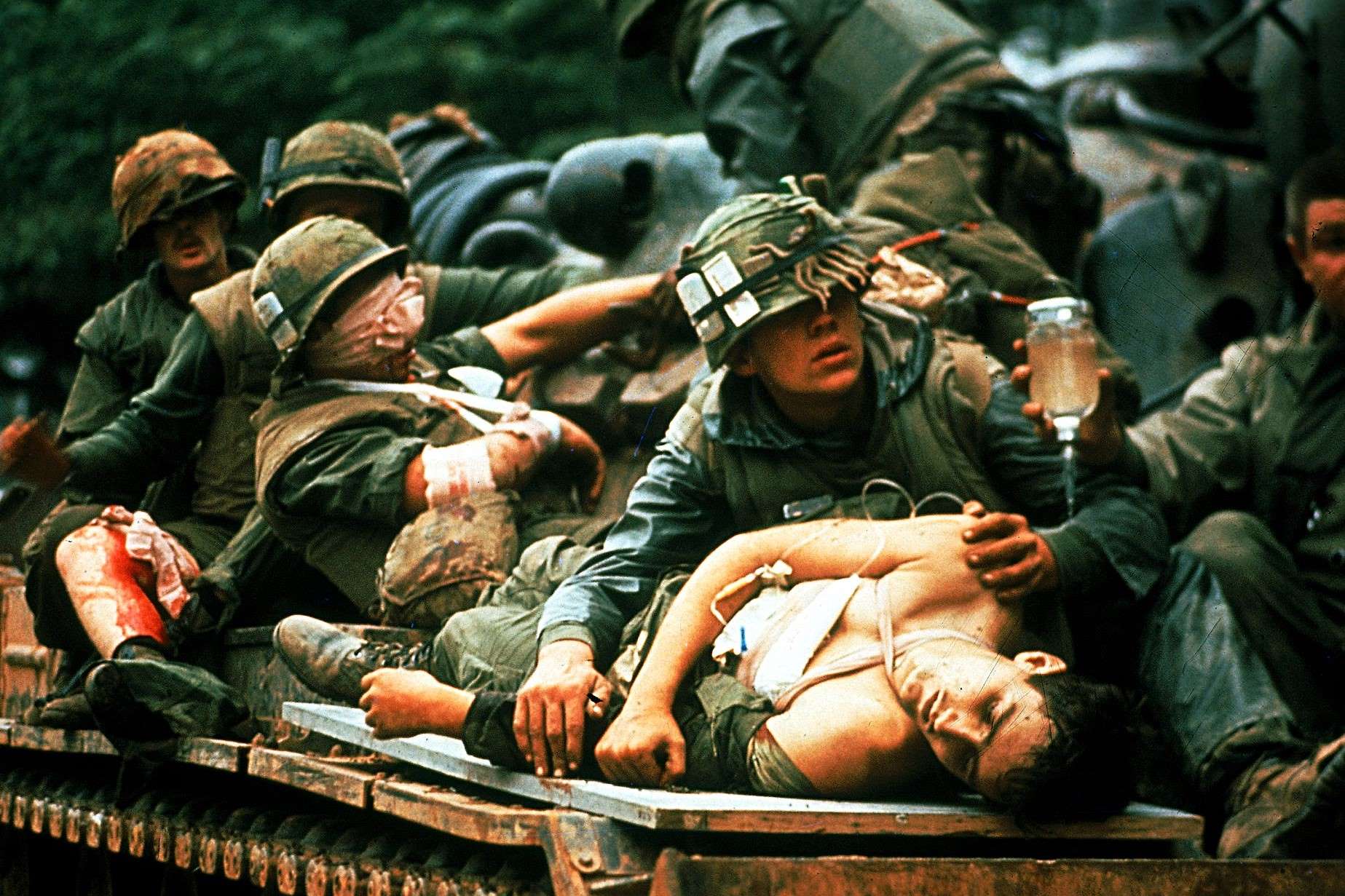
What was the Vietnam War? The Vietnam War, also known as the Second Indochina War, was a prolonged conflict from 1955 to 1975. It pitted North Vietnam and its communist allies against South Vietnam, supported by the United States and other anti-communist nations. This war was part of the larger Cold War struggle between the Soviet Union and the United States. Why did it happen? The main cause was the desire to prevent the spread of communism in Southeast Asia. What were the consequences? The war resulted in significant loss of life, widespread destruction, and lasting impacts on both Vietnamese and American societies.
Key Takeaways:
- The Vietnam War lasted from 1955 to 1975 and involved major battles, influential figures, and significant impact on civilians, leading to a lasting legacy in politics, culture, and international relations.
- The war sparked a powerful anti-war movement, led to the reunification of Vietnam, and continues to influence contemporary issues and relations between countries, emphasizing the importance of understanding the human cost of conflict.
The Beginning of the Vietnam War
The Vietnam War, a significant conflict in the 20th century, had complex origins. It involved numerous countries and had far-reaching consequences.
- The Vietnam War began on November 1, 1955, and lasted until April 30, 1975.
- It started as a conflict between North Vietnam, supported by its communist allies, and South Vietnam, backed by the United States and other anti-communist nations.
- The war was part of the larger regional conflict known as the Indochina Wars, which also included the First Indochina War against French colonial forces.
Major Battles and Operations
The Vietnam War saw many significant battles and military operations. These events shaped the course of the war and had lasting impacts.
- The Battle of Dien Bien Phu in 1954 was a major turning point, leading to the end of French colonial rule in Vietnam.
- The Tet Offensive in 1968 was a series of surprise attacks by the Viet Cong and North Vietnamese forces, which significantly affected U.S. public opinion on the war.
- Operation Rolling Thunder was a sustained bombing campaign conducted by the U.S. against North Vietnam from 1965 to 1968.
Key Figures in the Vietnam War
Several influential leaders and figures played crucial roles during the Vietnam War. Their decisions and actions had profound effects on the conflict.
- Ho Chi Minh was the leader of North Vietnam and a key figure in the Vietnamese communist movement.
- Ngo Dinh Diem was the first president of South Vietnam, serving from 1955 until his assassination in 1963.
- General William Westmoreland was the commander of U.S. forces in Vietnam from 1964 to 1968.
The Role of the United States
The United States played a significant role in the Vietnam War, providing military and financial support to South Vietnam.
- The U.S. involvement in Vietnam escalated after the Gulf of Tonkin Incident in 1964, where North Vietnamese forces allegedly attacked U.S. ships.
- At its peak, over 500,000 U.S. military personnel were stationed in Vietnam.
- The U.S. spent an estimated $168 billion on the war, which would be over $1 trillion today when adjusted for inflation.
Impact on Civilians
The Vietnam War had a devastating impact on civilians, with millions affected by the conflict.
- Approximately 2 million Vietnamese civilians died during the war.
- The use of Agent Orange, a herbicide, by U.S. forces led to severe health issues and environmental damage.
- The My Lai Massacre in 1968 saw U.S. soldiers kill hundreds of unarmed Vietnamese civilians, causing international outrage.
The Anti-War Movement
The Vietnam War sparked a significant anti-war movement, particularly in the United States. This movement influenced public opinion and policy.
- The Kent State shootings in 1970 occurred when National Guard troops fired on anti-war protesters, killing four students.
- The Pentagon Papers, leaked in 1971, revealed government secrets about the war and fueled public distrust.
- Prominent figures like Martin Luther King Jr. and Muhammad Ali spoke out against the war, highlighting its moral and ethical implications.
The End of the Vietnam War
The Vietnam War eventually came to an end, but its effects continued to be felt for years.
- The Paris Peace Accords, signed in 1973, aimed to establish peace and end U.S. involvement in Vietnam.
- Saigon, the capital of South Vietnam, fell to North Vietnamese forces on April 30, 1975, marking the end of the war.
- The reunification of Vietnam occurred in 1976, leading to the establishment of the Socialist Republic of Vietnam.
Aftermath and Legacy
The Vietnam War left a lasting legacy, influencing politics, culture, and international relations.
- Over 58,000 U.S. soldiers died in the Vietnam War, with many more wounded or missing.
- The war significantly impacted U.S. foreign policy, leading to a more cautious approach in future conflicts.
- Vietnam faced economic challenges and reconstruction efforts in the years following the war.
Cultural Impact
The Vietnam War has been depicted in various forms of media, reflecting its profound impact on society.
- Films like "Apocalypse Now" and "Platoon" portrayed the harsh realities of the war.
- Songs such as "Fortunate Son" by Creedence Clearwater Revival became anthems for the anti-war movement.
- Literature, including Tim O'Brien's "The Things They Carried," provided personal insights into the experiences of soldiers.
The Vietnam War Memorials
Memorials dedicated to the Vietnam War serve as reminders of the conflict and honor those who served.
- The Vietnam Veterans Memorial in Washington, D.C., designed by Maya Lin, lists the names of over 58,000 fallen soldiers.
- The Vietnam Women's Memorial, also in Washington, D.C., honors the women who served, particularly nurses.
- In Vietnam, the War Remnants Museum in Ho Chi Minh City provides a comprehensive look at the war from the Vietnamese perspective.
Lessons Learned
The Vietnam War taught valuable lessons about warfare, diplomacy, and the human cost of conflict.
- The concept of "Vietnam Syndrome" emerged, referring to the reluctance to engage in overseas military interventions.
- The war highlighted the importance of understanding local cultures and political dynamics in conflict zones.
- It underscored the need for clear objectives and public support in military engagements.
Ongoing Effects
The Vietnam War continues to influence contemporary issues and relations between countries.
- The normalization of U.S.-Vietnam relations in 1995 marked a significant step in healing the wounds of the past.
- Ongoing efforts to address the legacy of Agent Orange and unexploded ordnance demonstrate the long-term impact of the war.
Reflecting on the Vietnam War
The Vietnam War left a lasting impact on history, shaping politics, culture, and society. From the Gulf of Tonkin Incident to the Fall of Saigon, each event played a crucial role. The war introduced new tactics, like guerrilla warfare, and saw the use of Agent Orange, affecting countless lives. It also sparked significant anti-war movements and influenced music, literature, and film.
Understanding these facts helps us appreciate the complexities and human cost of the conflict. The war's legacy continues to influence international relations and military strategies. By learning about the Vietnam War, we gain insights into the resilience of people and the importance of striving for peace. This knowledge not only honors those who lived through it but also guides future generations in making informed decisions.
Frequently Asked Questions
Was this page helpful?
Our commitment to delivering trustworthy and engaging content is at the heart of what we do. Each fact on our site is contributed by real users like you, bringing a wealth of diverse insights and information. To ensure the highest standards of accuracy and reliability, our dedicated editors meticulously review each submission. This process guarantees that the facts we share are not only fascinating but also credible. Trust in our commitment to quality and authenticity as you explore and learn with us.


